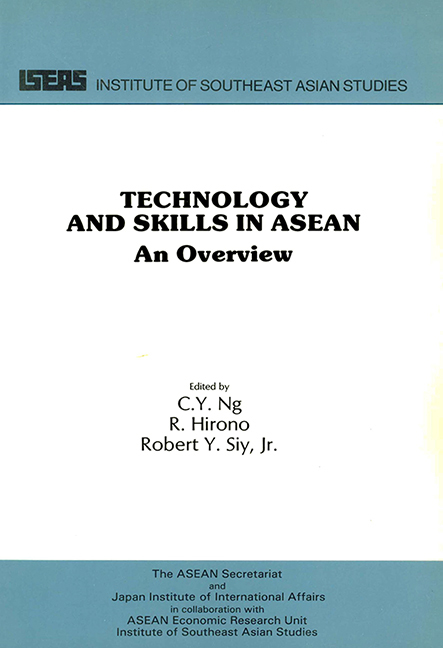Foreword
Published online by Cambridge University Press: 09 November 2017
Summary
One of the central objectives of the Association of Southeast Asian Nations (ASEAN), as embodied in the Bangkok Declaration under which ASEAN was founded, is the promotion of Southeast Asian studies. In this context, ASEAN warmly welcomed the offer of Mr Zenko Suzuki, the Prime Minister of Japan, in early 1981 to support the launching of an ASEAN Regional Studies Promotion Programme.
After extensive consultations among ASEAN member countries and between ASEAN and Japan, it was agreed that the ASEAN Regional Studies Promotion Programme, initially to extend over a period of five years, should focus on policy-oriented socio-economic research. Given the overriding importance that ASEAN attaches to economic development and the vital role of ASEAN-Japan economic relations in this regard, ASEAN-Japan Industrial Co-operation was adopted as the first topic of research under the Programme. The second topic chosen was Effective Mechanisms for the Enhancement of Technology and Skills in ASEAN. An integrated ASEAN–Japan Overview, together with volumes on the individual ASEAN countries, are the fruits of this second phase of research.
The recent history of ASEAN–Japan relations has been marked by a degree ol ambivalence. As the first Asian nation to industrialize successfully and to have risen as a phoenix from the ashes ol war-time destruction to the leading heights of industrial and technological power, Japan has always been held with a degree of awe and admiration by its southern ASEAN neighbours. Such awe and admiration have, however, been tinged with a certain amount of suspicion derived from war-time memories, especially as the impact of Japan's post-war economic expansion becomes increasingly felt in the ASEAN region.
On the Japanese side, historical circumstances and the need for economic reconstruction in the early post-war years made it unavoidable that, initially, its external relations were largely oriented towards the West, especially the United States. However, as Japan rose to global economic prominence, and its economic presence in Southeast Asia grew, it increasingly came to attach greater importance to its relationship with the ASEAN countries.
- Type
- Chapter
- Information
- Technology and Skills in ASEANAn Overview, pp. ix - xPublisher: ISEAS–Yusof Ishak InstitutePrint publication year: 1988

